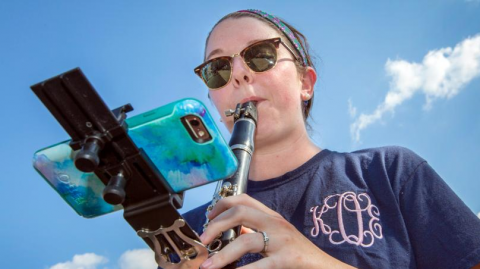FSU Marching Chiefs Taking Steps Toward Going Green

TALLAHASSEE, Fla. (WCTV) -- The Florida State University Marching Chiefs are taking steps toward going green.
If you attended the FSU vs. NC State football game this past weekend, you may have noticed something different during the Marching Chiefs' halftime performance-- band members using a small device known as the "eFlip".
FSU says the eFlip, developed by marching band students at Louisiana State University, allows band members to mount their smartphones to their instruments to easily view PDF files of music.
This device replaces the need for the flip chart with its printed sheet music and drill charts.
University officials say that the band's 400-plus members would go through about 200,000 sheets of paper each year on flip charts. Now, with the eFlip device, the Marching Chiefs are hoping to significantly reduce paper waste and save money.
FSU's College of Music Dean Patricia J. Flowers, who helped push the idea of using the eFlip forward, praised band directors Patrick Dunnigan and David Plack for pursuing the change.
"The Marching Chiefs’ elimination of flip charts represents the type of creativity encouraged by Florida State’s sustainable campus initiative, which calls on all of us to incorporate sustainable living practices on campus," Flowers said. "Patrick Dunnigan and David Plack have shown innovative leadership not only in charting their inspiring halftime shows, but also in stewarding resources and reducing waste. The Marching Chiefs continue to set a high standard for the garnet and gold — and green!"
Band members seem to be embracing the change already.
Katie Olney, a Marching Chiefs' clarinet player, said, "I really think it’s useful. It’s so easy when we learn new music; you just put the new music on here instead of having to print. It also saves a bunch of money for the College of Music and that helps us put money toward other places.”
Band director Patrick Dunnigan estimates that replacing the need for the flip charts will help the Marching Chiefs cut back on 85 to 90 percent of their paper consumption.
